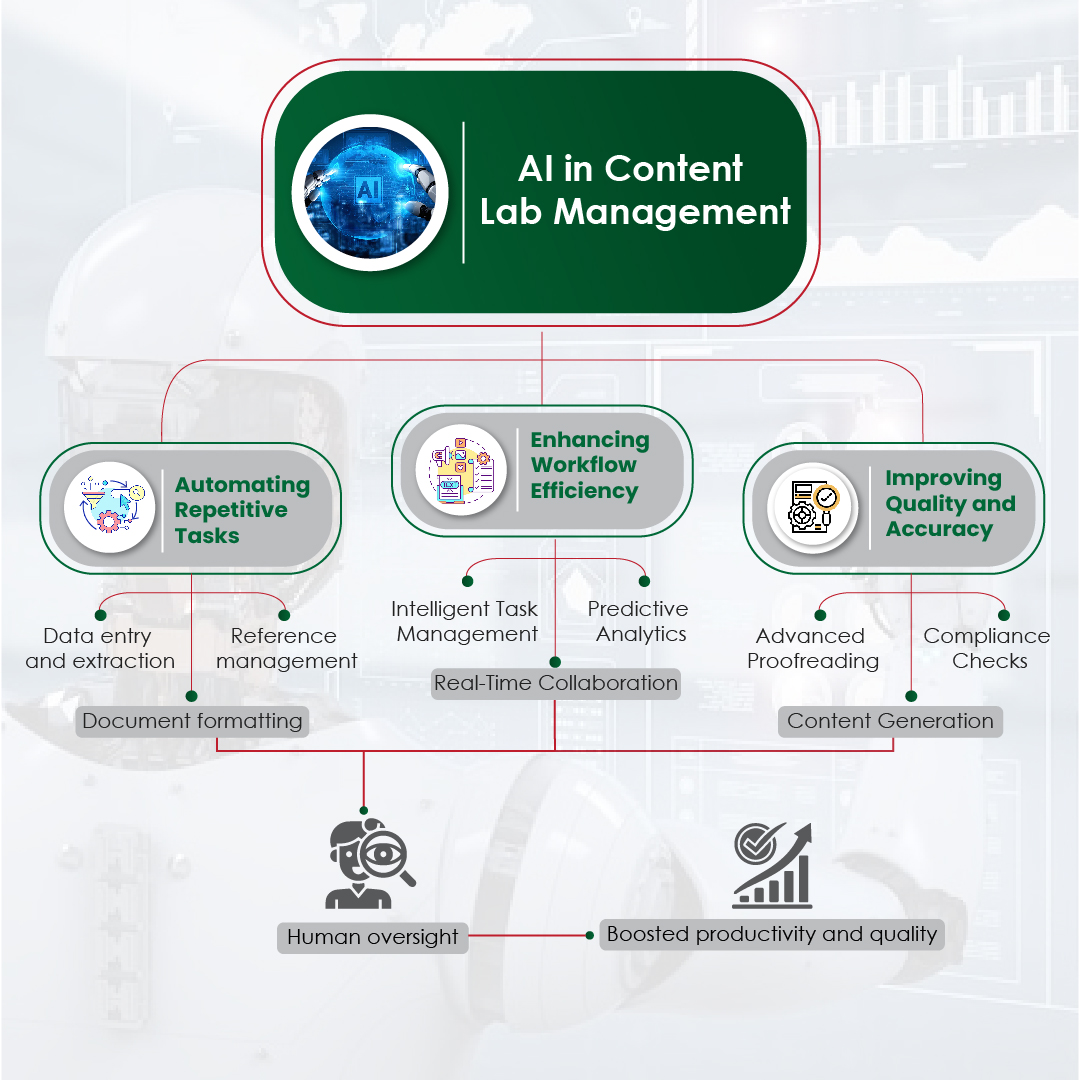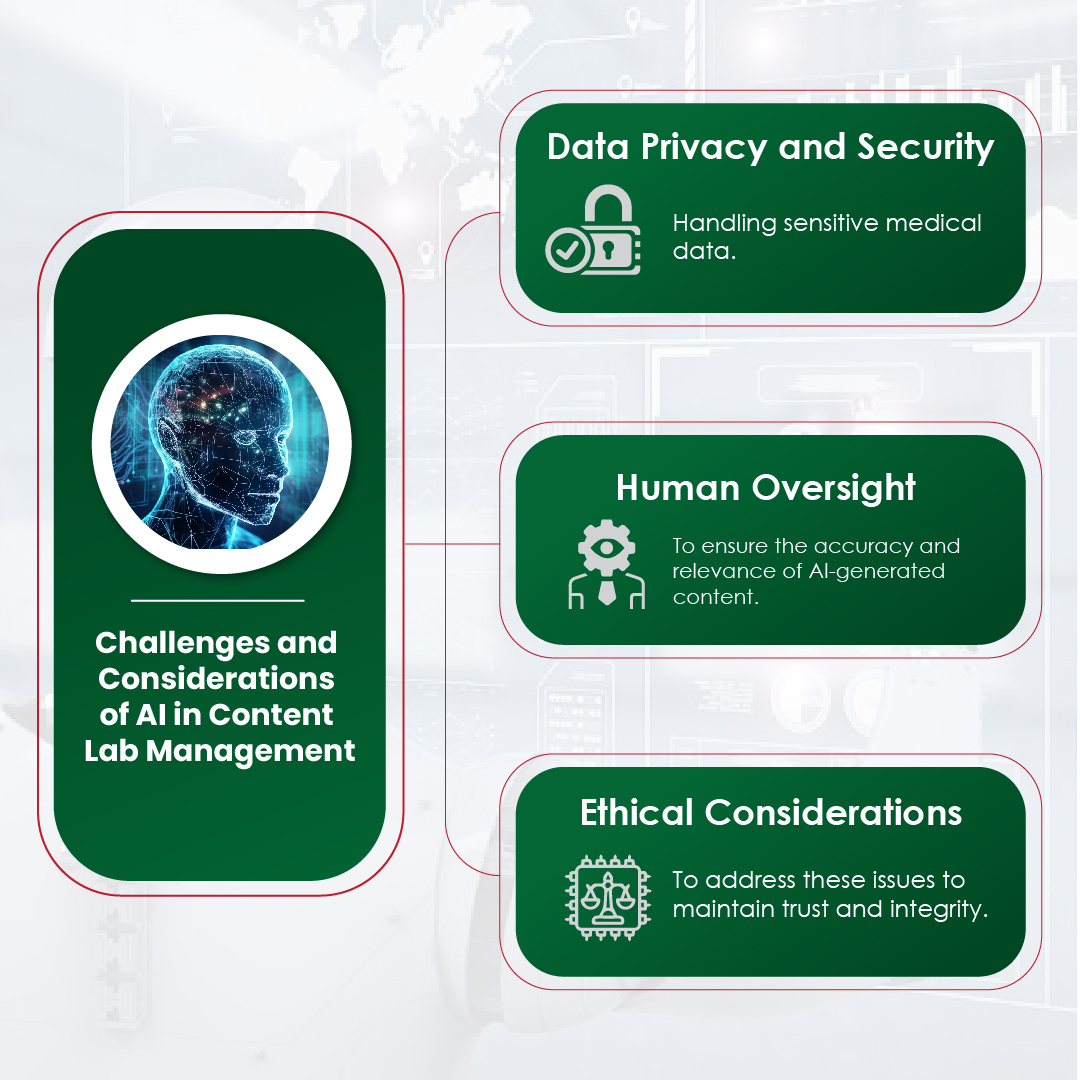
In the dynamic field of medical communication, managing a content lab effectively is crucial to ensure the delivery of high-quality and timely outputs. As the demands for precise, accurate, and compliant medical documentation increase, so does the need for efficiency in handling these tasks. Enter Artificial Intelligence (AI) – a transformative technology revolutionizing content lab management by automating repetitive tasks and improving workflow efficiency. At Turacoz, we understand the growing need to integrate and accept AI in the workflow whilst ensuring no data is compromised.
Role of AI in Content Lab Management
AI, with its capabilities in machine learning, natural language processing (NLP), and data analytics, offers a myriad of solutions to the challenges faced by content labs. It can automate routine tasks, streamline workflows, and enhance the accuracy and quality of medical content. Here’s how AI-powered solutions are making a significant impact:
Repetitive tasks such as data entry, document formatting, and reference management are time-consuming and prone to human error. AI can automate these tasks, save valuable time for medical writers and editors to focus on more complex activities.
AI can significantly enhance workflow efficiency by streamlining processes and improving collaboration among team members. This is achieved through intelligent task management, real-time collaboration tools, and predictive analytics.
Quality and accuracy are paramount in medical communication. AI can enhance these aspects through advanced proofreading, content generation, and compliance checks.
Human Intervention: The critical component
While AI offers numerous benefits, human intervention remains crucial in AI-powered content lab management. AI can handle many aspects of data processing and initial content creation, but human oversight is essential for ensuring the accuracy, relevance, and quality of the output. Medical writers and editors bring expertise and critical thinking that AI cannot replicate. They review and refine AI-generated content, provide context-specific insights, and make judgment calls that require a deep understanding of the subject matter. This collaborative approach, where AI handles the heavy lifting and humans add the finishing touches, ensures that the final product is both technically sound and contextually appropriate.

Case Studies: AI in Action
Case Study 1: Streamlining Clinical Trial Reporting
A global pharmaceutical company implemented an AI-powered solution to streamline its clinical trial reporting process. The AI tool extracted data from clinical trial databases and automatically populated predefined templates for clinical study reports. This reduced the time required to generate these reports by 50%, allowing the company to accelerate its drug development timelines and bring new treatments to market faster.
Case Study 2: Enhancing Quality Control
A medical communication agency adopted an AI-driven proofreading tool to enhance the quality control of its publications. The tool identified and corrected errors in grammar, punctuation, and medical terminology, ensuring that all documents were of the highest quality. As a result, the agency saw a significant reduction in rework and an increase in client satisfaction.
Case Study 3: Improving Regulatory Submissions
A biotech firm leveraged AI for regulatory writing and compliance checks. The AI system reviewed regulatory documents for adherence to guidelines and flagged any non-compliant sections. This automated review process not only ensured compliance but also reduced the review time by 40%, allowing the firm to expedite its regulatory submissions.
The Future of AI in Content Lab Management
The integration of AI in content lab management is still in its early stages, but its potential is immense. As AI technology continues to evolve, we can expect even more advanced solutions that will further optimize workflows, enhance quality, and drive productivity.
While the benefits of AI are clear, there are also challenges and considerations to keep in mind:

AI-powered content lab management is transforming the field of medical communication by automating repetitive tasks, enhancing workflow efficiency, and improving quality and accuracy. By leveraging AI, medical communication companies can boost productivity, ensure high-quality outputs, and meet the increasing demands of the industry. As AI technology continues to advance, its integration into content lab management will become even more impactful, driving innovation and excellence in medical communication.